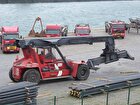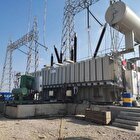Iranian Scientist Offers Green Alternative for Cement

C-Crete Technologies, a startup founded by MIT alumnus Rouzbeh Savary PhD ’11, has demonstrated a new way to make concrete with almost zero CO2 emissions.
“It’s a major milestone for the entire construction industry,” Savary said, according to the MIT website.
In the world of greenhouse gas emissions, concrete is a heavy hitter—generating roughly seven percent of total CO2 emissions globally.
In fact, the messy, decidedly unglamorous occasion marked a milestone in the race to reduce gigatons of global CO2 emissions. That’s because the concrete was made using a more sustainable binding material developed by the startup C-Crete. For C-Crete founder and president Rouzbeh Savary PhD ’11, the fact that the work went on as normal was a huge success. That’s because cleaning up an industry as large and conservative as construction is going to require a seamless, inexpensive transition.
C-Crete’s patent-pending materials bind with locally available mineral feedstocks and industrial byproducts to make cement-free concrete. The materials can be manufactured without the high temperatures needed for portland cement production, reducing energy requirements. The company says C-Crete’s binder also absorbs CO2 over time, further greening up the lifecycle of the material.
“Our vision is to be able to use local Earth’s crust composition to make cementitious binders,” Savary said. “Cement’s use is ubiquitous and there is no need to ship it across the globe.”
Now, with what Savary calls the first pour of portland-cement-free concrete in the US under its belt in Seattle, C-Crete is hoping to capitalize on broad interest and partnerships to scale rapidly.
The molecular combination C-Crete finally settled on is still under wraps as the company waits for its patents, but third-party testing has found that it meets the performance requirements of portland cement, such as strength and flowability.
C-Crete has received strong interest in partnerships, including from ready-mix companies, which operate the trucks with the spinning cement container in the back.
C-Crete’s current production facility can produce tens of tons of its binder per day. A typical cement manufacturer can produce more than 2,000 tons a day. But the company plans to partner with manufacturers to scale up quickly, and Savary has received inquiries from architects, engineers, construction companies, and building owners around the world to use C-Crete’s binder.
“Because of the concern about carbon emissions, more and more people are interested in solving this issue,” Savary said.
4155/i





















